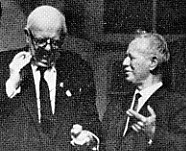presents:
M.A. SHOLOKHOV
by
C.P. Snow
M.A. Sholokhov's 107th Birthday, 24 May 2012. |
presents:
M.A. SHOLOKHOV
by
C.P. Snow
from 107 Years of Sholokhov, a SovLit.net celebration in honor of
M.A. Sholokhov's 107th Birthday, 24 May 2012.
 C.P. Snow & M.A. Sholokhov |
|
107 Years of Sholokhov |
